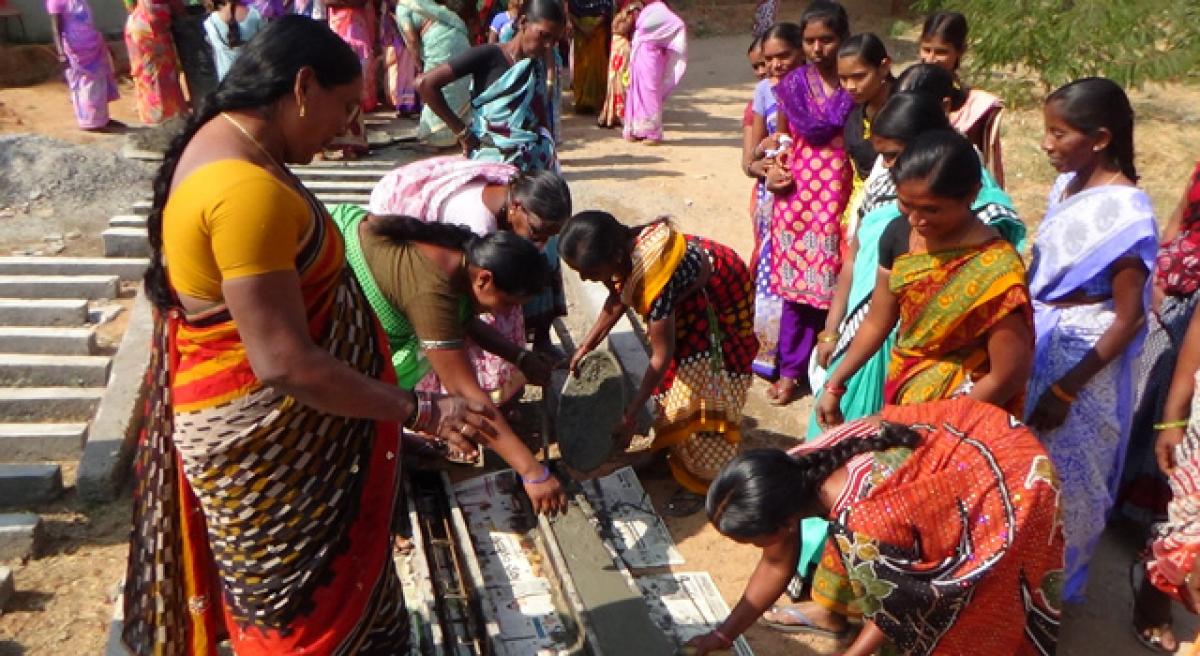Live
- Visakhapatnam: Govt students take part in Rural Sports Meet 2024
- Rajeev Chandrasekhar vs Shashi Tharoor: Bengaluru traffic problem being discussed in Kerala now!
- Asif files nomination for Vijayawada West constituency
- Nara Bhuvaneshwari celebrates Chandrababu birthday with cadre at Kuppam
- Over 16,000 posts to be filled in Health dept
- Google to Unveil Antivirus System in Android 15 Beta Release
- VITEEE-2024 begins from today
- YS Jagan's Memanta Siddham Bus Yatra starts at Godicherla
- Kishan Reddy realises he could not win, hence report card: BRS
- Hyderabad: Major fire breaks out at scrap godown
Just In
Economic empowerment of rural women with tech-enabled skills


Quietly, yet effectively the lives of rural women in the district are getting empowered and being transformed, courtesy Women Technology Park (WTP) here.
Warangal: Quietly, yet effectively the lives of rural women in the district are getting empowered and being transformed, courtesy Women Technology Park (WTP) here. The WTP is sponsored by Science for Equity, Empowerment and Development (SEED) Division under Department of Science and Technology (DST), Government of India.
Located here at SR Engineering College, it is the first ever Women Technology Park to be set up in Telangana. “Our objective is to empower women in the region and make them financially self-sustainable with holistic and integrated development of rural technologies in a mission mode”, asserted the park’s principal investigator Dr. V Suresh, who is also principal of the college.
The park is now engaged in demonstration and dissemination of rural technologies related to weaving, metal art ware, banana fibre extraction, construction and habitat services, agro and forest based processing technologies. Those trained are engaged in productive work. ‘Women in this area have limited exposure to modern technological developments.
The WTP aims to fill the gap in association with national labs and specialist science and technology institutions to ensure socio-economic uplift of women from poor and disadvantaged sections’, the project coordinator K Kiran Reddy told The Hans India. One significant achievement of the park is development of banana fibre extraction method producing good quality silk grade fibre yarn. Banana fibre also called ‘musa fibre’ is one of the strongest natural fibres made from the bark of banana plant.
In recent years, commercial value of banana fibre has increased and it is used all over the world for multiple purposes from making tea bags and sanitary napkins to Japanese Yen notes and car tyres, Kiran Reddy explained. ‘We have a sample of cloth made from banana fibre from ICAR-National Research Centre for Banana (NCRB) at Tiruchirappalli in Tamil Nadu. The cloth and the fibre we produced here are finer than the NCRB’s and the scientists at the NCRB acknowledged it’ he informed.
Women in Athmakur, Parkal, Shayampet, Chityal, Parvatagiri, Geesugonda and Mogullapallimandals in the district are being trained in banana fibre extraction. The women are also trained in making household articles from the fibre, besides making the cloth. Not just this, covering an area of around 20000 hectares in more than 17 villages of erstwhile Warangal women are given training in agro and forest based processing technologies.
“We have planned training on advanced designs of sheet metal brass engraving and artefacts for Pembarthi artisans” Kiran Reddy noted. The WTP is training women of several villages in the district in weaving technologies and dying. And the women who underwent training are confident to become master weavers, a rare feat for a woman in present day scenario.
“We can now manage every aspect of weaving” claimed the trainees Galla Radha, R Shoba and T Kantha while displaying their weaving skills as their trainer Ch Satyanarayana approved their claim. The trainer is specially invited from Bhiwandi, known for its textile industry. Under construction activities and habitat services huge number of women from low-income, BCs, SC/ST communities are trained in making bricks and cement poles, tiles grouting and others.
“Our endeavour is develop individual and group entrepreneurship and facilitate income generation”. “We at the WTP are doing extensive research and sourcing expertise from different places across the state. In order to create a market for the products and a steady income to the women it is planned to create an e-commerce website and ensure market linkages” Kiran Reddy revealed.

© 2024 Hyderabad Media House Limited/The Hans India. All rights reserved. Powered by hocalwire.com






